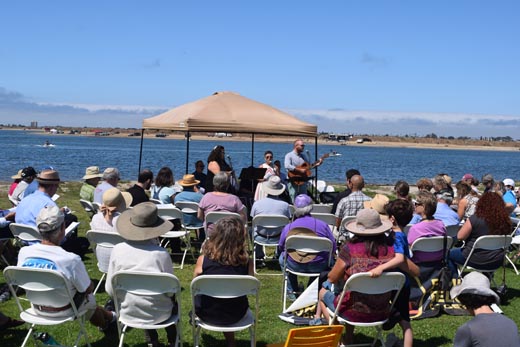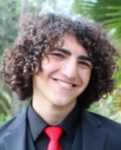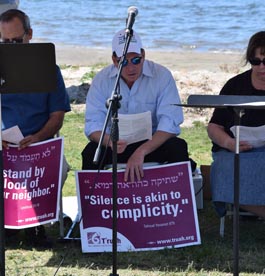
Story by Donald H. Harrison; photos by Shor M. Masori


SAN DIEGO — It was a venue of juxtaposition on Sunday, August 11. In Mission Bay, a dog rode on a paddle board, with it and its master somehow keeping their balance as the wake from a powerboat rocked the board on its course. Elsewhere, picnickers laid out their blankets and readied their barbecues.
Around a small tent, 90 congregants gathered to commemorate Tisha b’Av — a Jewish day of mourning — participating in a service in which they were led by seven rabbis, three of whose congregations are Reform, one Reconstructionist, one Conservative, and one the transdenominational San Diego Jewish Academy.
Under the watchful eyes of a security guard and a San Diego police officer, there to provide protection in an era of mass shootings, the compact congregation read in unison from a special Hebrew and English liturgy, and sang Hebrew and American folk songs led by Marshall Voit.


While Tisha B’Av recalls the destruction of the First and Second Jewish Temples and other Jewish tragedies associated with that day, the congregation that assembled on the shore of the bay was particularly mindful also of current tragedies that have befallen not only the Jewish people but our society at large.
Rabbi Yael Ridberg of the Reconstructionist-affiliated Congregation Dor Hadash set the tone, acknowledging that “It may be difficult to care about the destruction of the sacred center of the Jewish people so long ago, but if we are able to empathize with the tears and the rage of those oppressed in our community, in our city, the country, and the world, we may be better able to immerse ourselves in the prophetic and rabbinic mind and understand their sense of loss and destruction.
“We are witnesses to the destruction wrought in communities because of baseless hared and the depression of helplessness and hopelessness in the face of tyranny and by oppression,” Ridberg said.
“We are called in 2019 to respond to the degradation of humanity by xenophobia and fear-mongering, and recognize the displacement of people from their homes toward what they believe is a promised land.”
Rabbi Scott Meltzer of the Conservative-affiliated Ohr Shalom Synagogue said while none of us is old enough to have personally felt the whips of the Pharaoh in Egypt, or to have hidden as Anne Frank did in an attic in Amsterdam, or to have trekked miles from the Ukraine to freedom outside czarist Russia, “in every generation we acknowledge that we were there.” Furthermore, he said, “We are there as migrants flee as refugees from places of terror and oppression to the hope and promise of freedom.”
Making the linkage more explicit between the Jewish historical experience and the plight of refugees detained at America’s southern border, congregants read a passage from Anne Frank’s Diary, followed by a letter from a Honduran refugee, identified only as Javier.

Anne Frank wrote during the Holocaust: “Terrible things are happening outside. At any time of night and day, poor helpless people are being dragged out of their homes…. Families are torn apart: men, women and children are separated. Children come home from school to find their parents have disappeared.”
Javier wrote: “I was born in the capital of Honduras, Tegulcigalpa — one of the neighborhoods most entrenched in conflict. There was so much corruption and crime, I decided to flee from my country. I went through hunger, pain, sadness, loneliness, cold, but also very beautiful moments, joys, friendships…
“It’s terrible that in this time, one has to be detained for months to years to achieve safety,” Javier went on to say. “We’re treated like delinquents, when many of us are fleeing the violence that lives in our countries of origin, with dreams of being good people and achieving positive change.
“I pray that God touches the heart of the President of the U.S. and his work team, including congress people, magistrates, judges, journalists, and military. May Gold bless all of them and together we can construct a better world where freedom and equality and brotherhood reign.”
One of the congregants, who videoed portions of the proceedings, wore a shirt with a legend proclaiming “Keep the immigrants; deport Trump.” His hat also proclaimed his presidential choice: “Bernie” — a reference to Democratic presidential candidate and U.S. Senator from Vermont, Bernie Sanders.
At the feet of the rabbis who conducted the service were posters that read: “This is What ‘Never Again’ Looks Like” and “Don’t stand by the blood of your Neighbor,” — references respectively to the need to take action to prevent future Holocausts, and a paraphrase of the biblical mandate in Leviticus 19:16. Another poster contained a Talmudic quote: “Silence is akin to complicity.”
Rabbi Devorah Marcus of the Reform-affiliated Temple Emanu-El, said two objectives for holding the Sunday morning service were to “take a moment out of the difficulties that we read every day in the news” and to “take a moment out of the sorrow we feel consenting to the ongoing complacency, apathy, indifference, and evil in this world.”
She said that it is the job of Jews “to not give in to the thoughts of rage that come into our hearts and minds but instead to rise up affirming what we believe in.” This is a time, she said, not of unending obstacles but of “unending opportunities to build anew.” She urged the congregants to follow in the ancient Jewish tradition of “speaking words of love and kindness… caring for the poor, feeding the hungry, housing the homeless, visiting the sick and celebrating with brides … and grooms.”
In addition to Rabbis Ridberg, Meltzer, and Marcus, other rabbis who read from Scriptures and contemporary essays were Cantor/ Rabbi Arlene Bernstein and Rabbi Jeremy Gimble of the Reform-affiliated Congregation Beth Israel; Rabbi David Castiglione of the Reform-affiliated Temple Adat Shalom; and Rabbi Ally Jacobson of the San Diego Jewish Academy.
The peaceful assembly concluded after 45 minutes of prayer and song, and, there were no disruptions.
*
Harison is editor and Masori is a staff photographer of San Diego Jewish World. They may be contacted respectively at donald.harrison@sdjewishworld.com and shor.masori@sdjewishworld.com